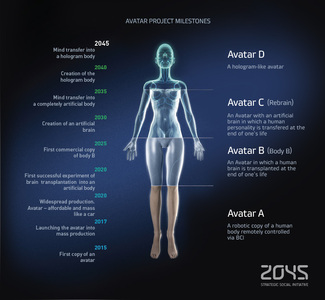/ Immortality Corporation Vision
Dear friends,
Let me introduce you the Immortality Corporation work schedule.
The schedule is based on the analysis of the already existing research programs of "2045" Initiative Group Members, as well as other scientific communities from Russia and abroad.
Artificial Body Research and Development will be divided into several tracks, to be pursued simultaneously.
The four tracks and their suggested deadlines are optimistic but feasible. This is our program for the next 35 years, and we will do our best to complete it.
The fourth development track seems the most futuristic one. It’s intent is to create a holographic body. Indeed, its creation is going to be the most complicated task, but at the same time could be the most thrilling problem in the whole of human evolution. Perhaps it is the ‘radiant mankind’ Konstantin Tsiolkovsky wrote about.
We are in the process of creating focus groups of experts. Along with these teams, we will prepare goal statements and research programs schedules.
We invite interested specialists to contact us and join the discussion. We welcome your contribution.
Dmitry ITSKOV
/ experts
- Ph.D. in Medicine, Head of the Cells and Tissues Growth Laboratory of Theoretical and Experimental Biophysics (Russian Academy of Sciences)
 Professor Boris K.
Professor Boris K.
GAVRILYUK“For skin on a cyborg, you simply need to create a nutrition system. And basically . . . we are not really complex in design! There are only a few systems: the circulatory system carries oxygen and nutrients; the excretory system extirpates the waste. The rest is end-effectors. To begin we can create a very simple living organism—then, later, more complex systems. . . .”
- Ph.D. in Physical and Mathematical Sciences, Senior Researcher of the V.I.Il`ichev Pacific Oceanological Institute (Russian Academy of Sciences), composer, philosopher
 Viktor Yurievich
Viktor Yurievich
Argonov“I think that before initiating a radical cyborgization of the brain, you have to find the neural correlate of consciousness. Does it have a physical or purely informational nature in the form of neurosignals? Is there a group of neurons that is directly responsible for consciousness? Or perhaps consciousness is produced by still smaller elements within neurons. . . .”
- Ph.D. in Biology, Inventor of the "Bioartificial liver" device
 Professor Vyacheslav Y.
Professor Vyacheslav Y.
RYABININ - Doctor of philosophy, professor
 Sergei V.
Sergei V.
KrichevskiyOne temporary solution, in my opinion, is to create a “cosmic person”, and start doing so on Earth, within the “future person” project, as part of the “Russia 2045” Initiative.
- Chairman of the organizing committee of the political party “Evolution 2045”, founder of the movement “Russia 2045”, president of the congress GF2045
 Dmitry
Dmitry
ItskovDo you remember The Surrogates movie? It perfectly demonstrates the abilities of a mind-controlled artificial human body, or an avatar. It is what our project is all about. The Surrogates’ screenwriters were not consistent enough (probably due to the lack of imagination) in the evolution of their ideas. There is no doubt that the mankind needs an avatar.
- Russian futurologist writer, journalist
 Maxim
Maxim
Kalashnikov"This is something that nobody in the world could pass up. Creation of super- and posthuman, I believe, is a gaining of new strength while saving from degeneration and extinction, . This could potentially make Russia the world leader…’
- President of the Center for Cellular and Biomedical Technologies, First Moscow Medical University and expert on the conscious management of health, biotherapy and the prevention of aging
 Dmitry A.
Dmitry A.
SHAMENKOV‘The body gradually becomes artificial; new tissues replace existing ones, and new media, somehow extending the limits of our body, are being invented. Of course, man and technology are being knitted together. Step by step, we are moving towards the formation of a cybernetic organism...’
- PhD, Professor of Oxford University, co-founder (with David Pearce) of the World Transhumanist Association
 Nick
Nick
Bostrom"The digital path [of extreme longevity] would be, if we could develop technology eventually to do human whole brain emulation, where we would create a very detailed model of a particular human brain and then emulate that in the computer, where we would have an indefinite life span potential, we could make backup copies and so forth..."
- Doctor of physics and mathematics, Head of the Department of Neuroinformatics at the Center for Optical Neural Technologies of the Scientific Research Institute for System Analysis of the Russian Academy of Sciences
 Witali L.
Witali L.
Dunin-Barkowski' If the job is to be taken seriously, we can get a detailed model of a brain prototype within five years or so. And since many research areas concerned with the subject develop in parallel, it may well be that we can achieve these results even faster...'
- Artist, art theorist, Curator of the National Center of Contemporary Arts (Kaliningrad branch)
 Dmitry H.
Dmitry H.
BULATOV‘In the near future, hybrid combinations of living and nonliving elements will help to recover lost or missing original features. And of course, greatly enhance them in comparison to the usual ones...’
- Researcher, fiction and alternate history theorist. Is a literary critic and political essayist, sociologist, socionics specialist and military historian
 Sergey
Sergey
Pereslegin"Project 2045 also requires enormous engineering support. And I would claim that both for Russia and for the entire world, the only possibility of overcoming the phase barrier is not to solve biological tasks, not biotechnology, but to solve the task for maintaining engineering for the critical period of 20 years".









 LinkedIn
LinkedIn
 LiveJournal
LiveJournal
 Google
Google
 Twitter
Twitter
 Facebook
Facebook
 Я.ру
Я.ру
 ВКонтакте
ВКонтакте
 Mail.ru
Mail.ru